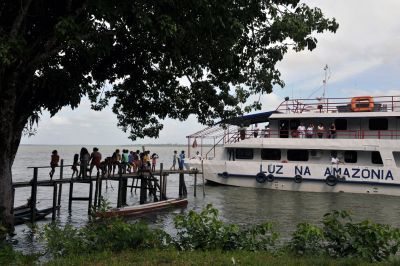Hospital ship plugs health gap in Brazil's Amazon

Your support helps us to tell the story
From reproductive rights to climate change to Big Tech, The Independent is on the ground when the story is developing. Whether it's investigating the financials of Elon Musk's pro-Trump PAC or producing our latest documentary, 'The A Word', which shines a light on the American women fighting for reproductive rights, we know how important it is to parse out the facts from the messaging.
At such a critical moment in US history, we need reporters on the ground. Your donation allows us to keep sending journalists to speak to both sides of the story.
The Independent is trusted by Americans across the entire political spectrum. And unlike many other quality news outlets, we choose not to lock Americans out of our reporting and analysis with paywalls. We believe quality journalism should be available to everyone, paid for by those who can afford it.
Your support makes all the difference.For the residents of Mocajuba Island, dirt-poor folk who sleep in wooden shacks under the Amazon's vast canopy of green, the once-a-year visit by the hospital ship is an occasion akin to Christmas.
They greet the two-level white vessel and its team of volunteer medical staff with the enthusiasm and attire reserved for special occasions.
Once on board, they eagerly push forward, without exception, to be treated for the variety of ills accumulated in a part of the world almost untouched by civilization.
This is the mission of the Light of the Amazon, a floating hospital run as a charity program since 1962 to improve the physical health of the riverside denizens in Brazil's remotest region.
The ailments suffered by the community of 250 people, located four hours upriver from the northern city of Belem, attest to the harshness of jungle life and ignorance about hygiene.
"Intestinal parasites are very common, due to the untreated water that they usually use. Even if they treat the water, the kids go swimming in the river and swallow water from the river," says one of the doctors, Maria-Auxiliadora Martins.
She is treating a young girl with an ear infection and a stomach parasite. Most likely she also has the most common ailment seen by the staff: decaying teeth.
The onboard dental surgery works for such long hours treating the villagers that the two dental student nurses working the drill complain of shoulder pain afterwards.
On shore, staff try to instill a regime of dental hygiene, getting the children to sit for long minutes with fluoride paste on their teeth, and using a toothbrush.
For the older members of the village, like Pedro Silva, 67, it's too late.
"I'm going to get a consulting note to see about the last tooth I have in my mouth," he says with a cackle that frames the solitary tooth in a cavern of black.
Some of the problems are more serious. One middle-aged man looks around in befuddlement, blood coagulating on his forehead from a bathroom fall that, he finds out, also broke his shoulder.
Sexually transmitted diseases are also rife, as are teenage pregnancies.
On a past trip to another village, the ship's medics discovered one sickly girl was suffering from leukemia.
While the ship sets about treating the residents, some of the staff hand out simplified Bibles, to be colored in or taken apart as jigsaw puzzles, to the scores of children.
These are gifts from the charity that owns the vessel: the Brazilian Bible Society, the world's biggest publisher of the Christian book which sees spiritual health as much in need of help as physical wellbeing.
On both counts, the Amazon is a fertile region for the hospital ship's services.
The impoverished communities which live in isolation, relying on the rivers as the only practicable pathways through the jungle, are grateful for the medical aid they would never otherwise see, and the literacy boost provided by the Bibles.
Acyr Degerone Junior, in charge of the ship's program, says the idea is "to treat people who don't have medical access, who can't get to a town, who don't have that option."
He won't be drawn, though, on whether the fact that the ship fulfils a need means that public authorities are not doing enough to care for the communities.
"The program is concerned more with giving an option to these people, than us thinking about whether we see an absence of public services in these areas," he said.
After a two-day stop on Mocajuba Island, the hospital ship slips its moorings and heads out into the river, back to Belem for restocking and to change its team of volunteers.
It will be a brief return to civilization before returning to the jungle waterways, on yet another of its thrice-weekly trips.
Join our commenting forum
Join thought-provoking conversations, follow other Independent readers and see their replies
Comments